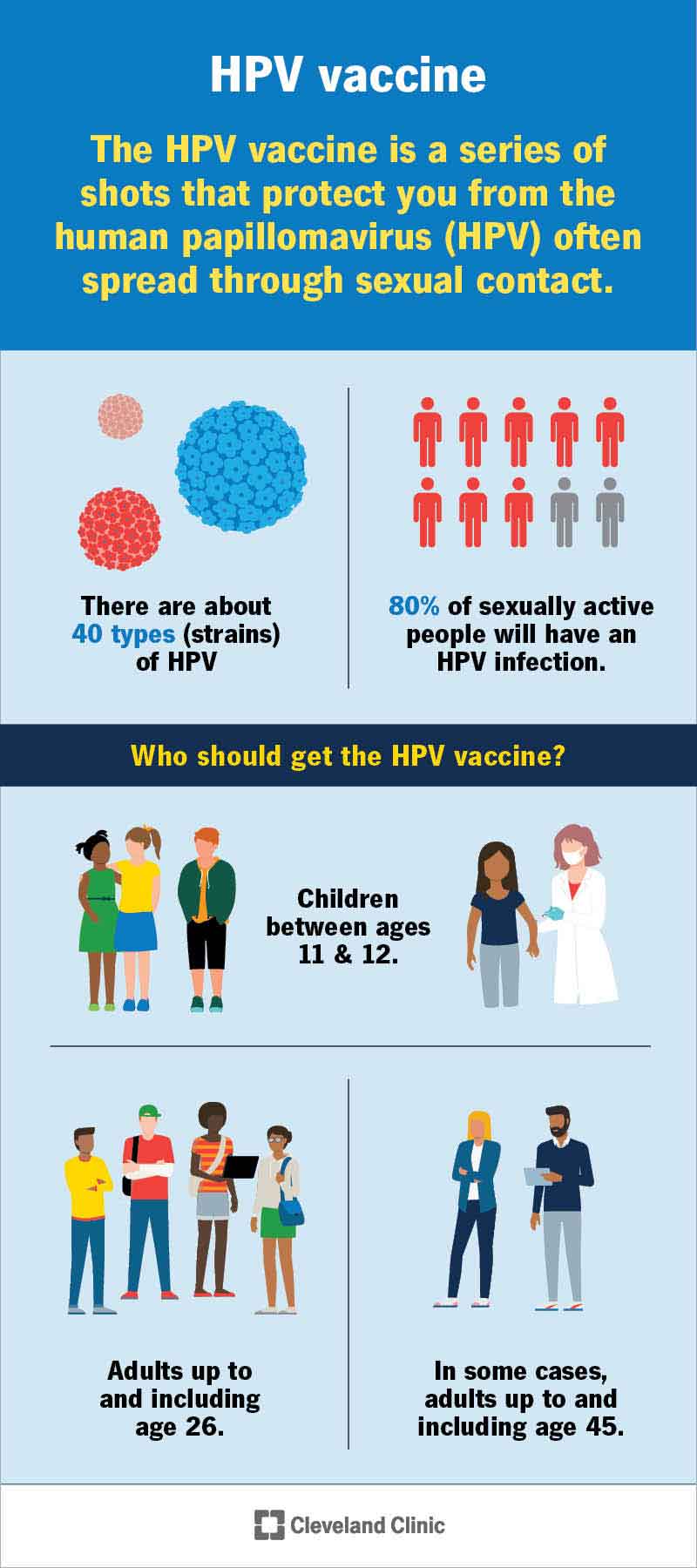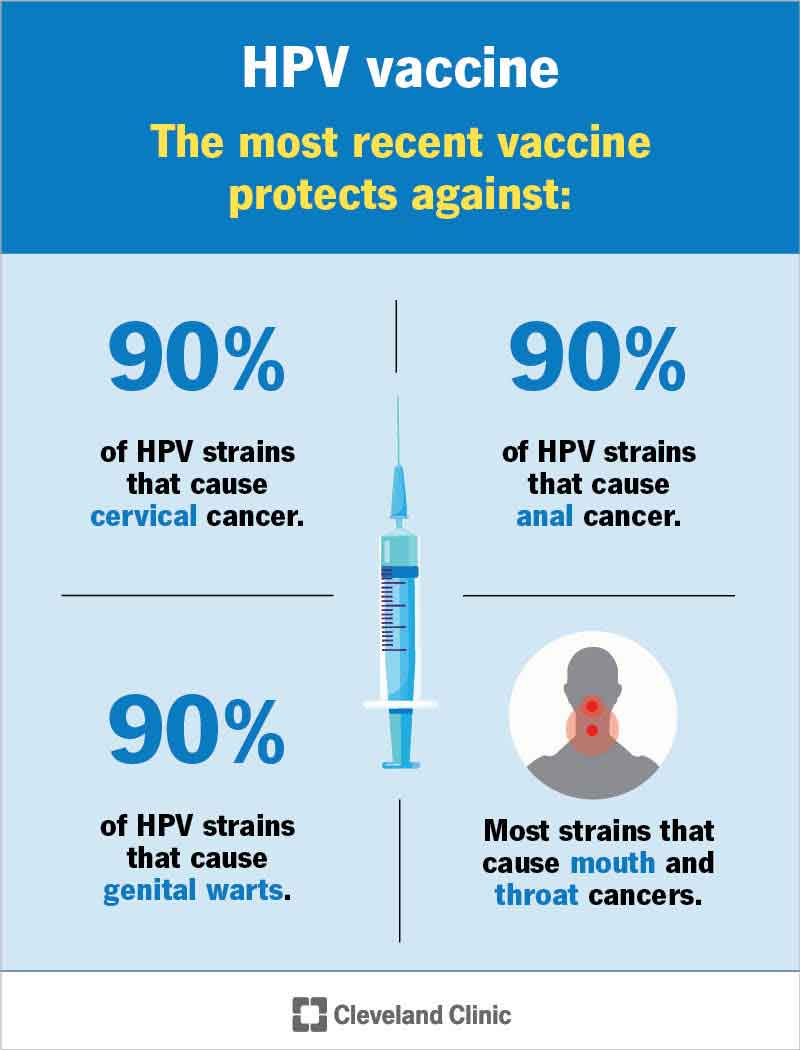The HPV vaccine protects against certain cancers caused by human papillomavirus (HPV) infection. HPV is a common STI that can cause cervical cancer and cancers affecting the vagina, vulva, penis, anus and throat. The vaccine can also protect against genital warts. The HPV vaccine is recommended for people ages 9 to 45.
Advertisement
Cleveland Clinic is a non-profit academic medical center. Advertising on our site helps support our mission. We do not endorse non-Cleveland Clinic products or services. Policy

Image content: This image is available to view online.
View image online (https://my.clevelandclinic.org/-/scassets/images/org/health/articles/21613-hpv-vaccine-1)
The HPV vaccine is a series of shots that can protect you from an HPV (human papillomavirus) infection. HPV is a common sexually transmitted infection (STI) that spreads through skin-to-skin contact. There are about 40 types (strains) of HPV that can spread through sex. It’s so common that 80% of sexually active people will have an HPV infection at some point. Often, healthy immune systems can fight off the virus.
Advertisement
Cleveland Clinic is a non-profit academic medical center. Advertising on our site helps support our mission. We do not endorse non-Cleveland Clinic products or services. Policy
But some HPV infections don’t go away. Some progress to cancer. For example, most cervical cancer and cancers affecting your genitals are associated with an HPV infection. HPV infections are also responsible for genital warts.
This is why getting the HPV vaccine is so important. It’s a safe and effective way to prevent infections if you’re ever exposed.
The HPV vaccine prevents HPV infections that can progress to cancer or genital warts. This part’s important: The vaccine prevents infections, but it isn’t a treatment. If you’ve already been exposed to a particular strain of HPV, the vaccine can’t heal the infection.
The HPV vaccine can protect you from strains you haven’t encountered before. These include high-risk types and low-risk types. High-risk HPV strains can progress to cancer. Low-risk types don’t increase your cancer risk, but they can cause nuisance conditions like genital warts.
The HPV vaccine prevents infections that can lead to:
But, not all HPV vaccines provide the same protection. There are three different vaccines. Each protects against different strains of HPV.
Advertisement
Two of the vaccines are no longer available in the U.S. but are available in other countries. Still, many people in the U.S. received these earlier vaccines. It’s important to understand what protection you have based on the vaccine you received.

Image content: This image is available to view online.
View image online (https://my.clevelandclinic.org/-/scassets/images/org/health/articles/21613-hpv-vaccine-2)
The newest HPV vaccine, Gardasil-9, protects against most HPV-related cancers and genital warts.
Since 2017, Gardasil-9 has been the only HPV vaccine available in the United States. It provides the most comprehensive protection of any HPV vaccine. Gardasil-9 protects against infections associated with:
Gardasil was the first FDA-approved HPV vaccine. It became available in 2006. Gardasil protects against infections associated with:
Unlike Gardasil-9, the original Gardasil doesn’t protect against the additional HPV strains that cause 20% of cervical cancers. So, while Gardasil-9 reduces your risk of cervical cancer by 90%, the original Gardasil reduces your risk by 70%.
The FDA approved Cervarix in 2009. Cervarix only protects against high-risk strains of HPV associated with cancer. It doesn’t protect you from the strains that cause genital warts. Cervarix protects against infections associated with:
Everyone, regardless of sex, should get vaccinated before they’re exposed to HPV through sexual activity. Remember — the HPV vaccine can only protect you from strains of HPV you haven’t already been exposed to via an infected partner.
The age recommendations from the Centers for Disease Control (CDC) for getting the vaccine reflect this rationale.
Advertisement
The age limit for getting vaccinated (first 26 and now 45) is based on the thinking that most people have had sex (and potentially been exposed to multiple strains of HPV) by adulthood. If you’ve already been exposed, the vaccine won’t provide much benefit. Related, not all insurance companies cover the costs of the vaccine past ages 26 or 45.
But this doesn’t mean you can’t personally benefit from the vaccine if you’re a middle-aged adult. For example, if you’ve had few or no previous partners, getting vaccinated can potentially protect you from HPV if you’re about to start a sexual relationship.
Everyone’s situation is different. Your healthcare provider can advise you based on your sexual history.
You shouldn’t get the HPV vaccine if you:
Advertisement
The vaccine contains a simulation of the virus — not the actual live virus. The vaccine stimulates your immune system to produce antibodies that fight HPV. If you’re exposed to the actual virus, these antibodies prevent it from causing an infection.
You’ll get the vaccine as a series of shots. The number of shots depends on the age at the first dose.
People of any age with a condition that causes them to have a weakened immune system (immunocompromised) should follow the HPV vaccine schedule that requires three shots, not two.
The HPV vaccine can reduce the risk of HPV-related cancers and genital warts in any person who is (or will one day be) sexually active.
The HPV vaccine became widely available to women in 2006 to prevent cervical cancer. Rates of cervical cancer have been going down since. HPV infections related to cancer and genital warts have dropped by over 80%.
Advertisement
The FDA didn’t approve HPV vaccines for men until 2011. Unfortunately, HPV vaccination rates among men remain low. This is especially concerning, given the rise of HPV-related throat cancers in this group. The vaccine can prevent these cancers as well as anal and penile cancers.
If you’re male, getting vaccinated can also protect your sexual partners. Although you can’t develop cervical cancer, you can infect an unvaccinated sexual partner with a cervix with HPV strains that put them at serious risk of cervical cancer — unless you’re vaccinated.
The best defense against the virus is for everyone — regardless of sex — to get vaccinated before becoming sexually active.
Many people who’ve been vaccinated for several years wonder if they need a booster shot. The short answer is no. The vaccines continue to provide protection against HPV years after people complete the series. Currently, we know that:
Scientists will continue to monitor the vaccine’s effectiveness over time.
The HPV vaccine is safe. Still, as with any vaccination, you may notice mild side effects briefly after getting the shot. Your provider will monitor you to ensure you’re OK before going home.
Some of the most common side effects include:
There aren’t any long-term side effects.
Contact your healthcare provider with any concerns or questions about getting the vaccine. This includes making sure you understand the vaccination schedule for your child. If you’re an adult age up to and including age 45 and haven’t been vaccinated, ask your provider if you could benefit from getting the HPV vaccine.
It depends. Much depends on your sexual history. Although the vaccine can’t protect you from the current strain causing the infection, it can protect you from strains you haven’t encountered. But, if you’ve already likely been exposed to various strains of HPV, the vaccine may not benefit you.
Weigh potential benefits with your provider.
The current recommendations advise getting vaccinated up until age 45, depending on your sexual history. It’s best to get vaccinated around 11 or 12, before becoming sexually active and when your immune response to the vaccine is strongest. People as young as 9 can safely receive the vaccine.
Absolutely. You’ll still need regular Pap tests and HPV tests regardless of your vaccination status. The vaccines provide excellent protection from most HPV-related infections. But none of the vaccines protect against all high-risk HPV strains. Anyone with a cervix still needs routine screening to catch (and treat) cervical cancer in the early stages when it’s curable.
Many people who received the earlier vaccines (Gardasil and Cervarix) wonder if they need Gardasil-9, which protects against more HPV strains. The CDC doesn’t currently recommend additional vaccinations because the earlier versions protect against the most high-risk strains of HPV. Alongside regular Pap and HPV tests, these vaccines provide excellent protection against cervical cancer.
If you have a question about potential benefits based on your vaccination and sexual history, talk to your provider.
Some people opt out of the vaccine because they’re allergic to the ingredients. You shouldn’t get the vaccine if it poses a potential risk to your health. For most people, however, the vaccine is both effective and safe.
Unfortunately, other people opt out of the HPV vaccine because of misinformation.
For example, many men think the vaccine only protects against cervical cancer. But this is false. It also prevents cancers affecting your throat, penis and anus. It prevents genital warts.
Some parents or caregivers choose not to vaccinate their children because they worry it’ll encourage them to have sex prematurely. Choosing not to vaccinate comes from a place of love and concern for their child’s sexual development. But the decision to become sexually active is much more complex than a single vaccine. Also, no research supports the view that the vaccine prompts people to start having sex.
However, research does show that the vaccine can protect your child in the future when they’re mature enough to engage in healthy adult sexual relationships. It can save their life.
The HPV vaccine is one of our most powerful weapons against cervical cancer and other HPV-related cancers. If you’re a parent or caregiver, talk to your provider about vaccinating your child. If you’re an adult 45 years old or younger who’s never been vaccinated (or who didn’t complete the vaccine), ask your provider if the HPV vaccine could benefit you.

Sign up for our Health Essentials emails for expert guidance on nutrition, fitness, sleep, skin care and more.
Learn more about the Health Library and our editorial process.
Cleveland Clinic’s health articles are based on evidence-backed information and review by medical professionals to ensure accuracy, reliability and up-to-date clinical standards.
Cleveland Clinic’s health articles are based on evidence-backed information and review by medical professionals to ensure accuracy, reliability and up-to-date clinical standards.
Don’t ignore sexually transmitted infections. Cleveland Clinic experts will treat them confidentially and quickly in a judgment-free environment.
